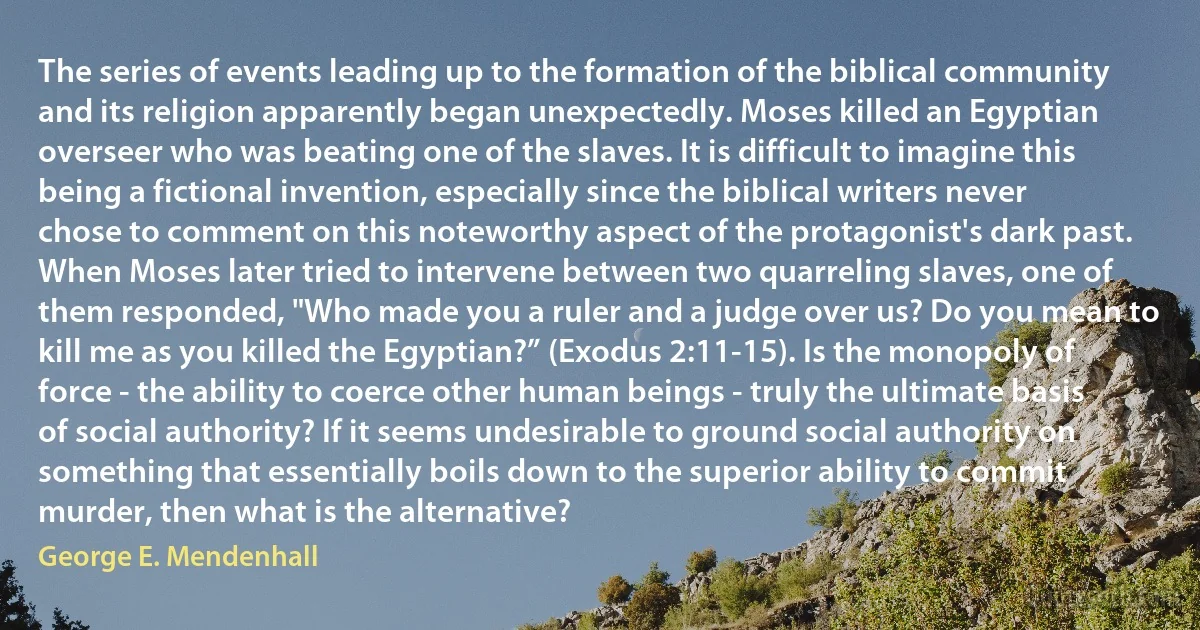
The series of events leading up to the formation of the biblical community and its religion apparently began unexpectedly. Moses killed an Egyptian overseer who was beating one of the slaves. It is difficult to imagine this being a fictional invention, especially since the biblical writers never chose to comment on this noteworthy aspect of the protagonist's dark past. When Moses later tried to intervene between two quarreling slaves, one of them responded, "Who made you a ruler and a judge over us? Do you mean to kill me as you killed the Egyptian?” (Exodus 2:11-15). Is the monopoly of force - the ability to coerce other human beings - truly the ultimate basis of social authority? If it seems undesirable to ground social authority on something that essentially boils down to the superior ability to commit murder, then what is the alternative?
George E. MendenhallRelated topics
ability alternative aspect authority beating begin chose commit dark egyptian exodus force formation ground human intervene judge kill later mean monopoly noteworthy overseer past religion series something superior try ultimateRelated quotes
But the most lasting agony of this war was suffered, not by the defeated, but by the victors. For when their passion had cooled the Americans could not easily disguise from themselves that they had committed murder. They were not at heart a brutal folk, but rather a kindly. They liked to think of the world as a place of innocent pleasure-seeking, and of themselves as the main purveyors of delight. Yet they had been somehow drawn into this fantastic crime; and henceforth an all-pervading sense of collective guilt warped the American mind. They had ever been vainglorious and intolerant; but now these qualities in them became extravagant even to insanity. Both as individuals and collectively, they became increasingly frightened of criticism, increasingly prone to blame and hate, increasingly self-righteous, increasingly hostile to the critical intelligence, increasingly superstitious.

Olaf Stapledon
Another conspicuous failure of classical mechanics was with one aspect of the problem of radiation. ...Imagine a crowd of steel balls rolling about on a steel floor. ...There must... be a steady leakage of energy from... causes, such as air resistance and the friction of the floor, so the balls will eventually lose energy, and, after no great length of time, will be found standing at rest on the floor. The energy of their motion seems to have been lost... most of it has been transformed into heat. The classical mechanics predicts that this must happen; it shows that all energy of motion, except possibly a minute fraction of the whole, must be transformed into heat whenever such a transformation is physically possible. It is because of this that perpetual-motion machines are a practical impossibility.

James Jeans
What constitutes the primordium of the adult parasite [ Rhizocephala ]? What can be injected through the narrow opening of the dart's hypodermic device? ...Imagine going through such complexity as nauplius, cyprid, and kentrogon - and then paring yourself down to just a few cells for a quick and hazardous transition to the adult stage. What a minimal bridge at such a crucial transition! ...But other species have achieved the ultimate reduction to a single cell! The dart injects just one cell into the host's interior, and the two parts of the life cyle maintain their indispensable continuity by an absolutely minimal connection - as though, within the rhizocephalan life cycle, nature has inserted a stage analogous to the fertilized egg that establishes minimal connection between generations in ordinary sexual organisms.

Stephen Jay Gould
The Slav is never able to build anything himself. In the long run, he's not capable of it. I'll come back to this later. With the exception of a few phenomena produced by Asia every couple of centuries, through that mixture of two heredities which may be fortunate for Asia but is unfortunate for us Europeans - with the exception, therefore, of an Attilla, a Ghenghis Khan, a Tamerlaine, a Lenin, a Stalin - the mixed race of the Slavs is based on a sub-race with a few drops of blood of our blood, blood of a leading race; the Slav is unable to control himself and create order. He is able to argue, able to debate, able to disintegrate, able to offer resistance against every authority and to revolt. But these human shoddy goods are just as incapable of maintaining order today as they were 700 or 800 years ago, when they called in the Varangians, when they called in the Ruriks.

Heinrich Himmler
I think its time to get motivated folks. I don't know what you're doing, but it's time to get really moving. We are rapidly running out of time. What do we do? Number one, you need to realize that God is in control. Don't get nervous, get busy, but don't get nervous. For he's the potter, we're the clay. Do what he says, simple. We should be as wise as serpents and harmless as doves. Be careful for nothing, full of care. Don't get nervous, just get busy. We should pray for those in authority. If you were praying for your senators, you would know their names, wouldn't you? We're God's children. It's our job to obey him. Preach the Gospel. We're suppose to be the salt of the earth. Salt does a lot of interesting things. Salt preserves; you should be a preserving force in your community. Salt irritates. If nobody is irritated with you, you aren't a good Christian.

Kent Hovind
